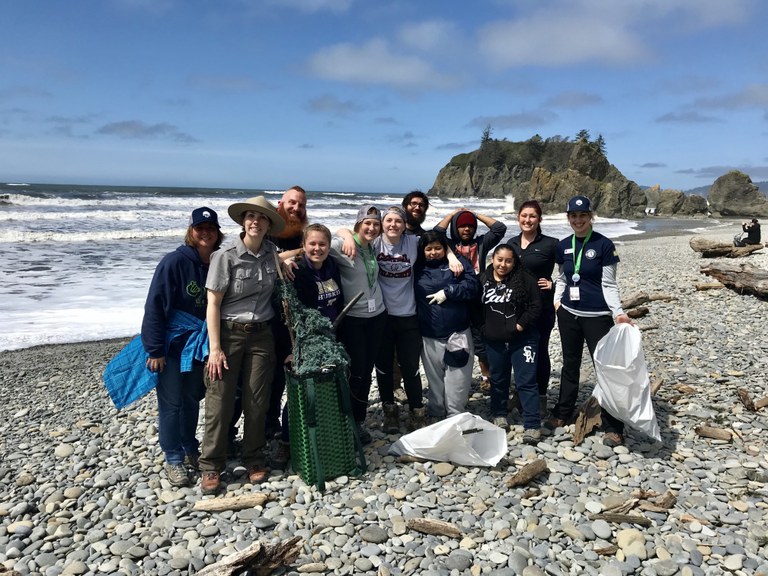Young Stewards Explore and Lend a Hand on Washington Trails
The power of partnerships helps the Deaf T-Birds, a high school group, get out to explore and clean up Olympic beaches.
by Megan Young
“Let’s go!”
The group of high school students signed to me as we stood on the trail to Ruby Beach in Olympic National Park. The students, members of Mount Tahoma High School’s Deaf T-Bird Club, came to the park to volunteer during a beach cleanup event as part of the City to Summit Program — a project managed by Seattle Area National Park Sites in partnership with Washington Trails Association and the YMCA of Greater Seattle. The program encourages community groups such as the Deaf T-Birds to recreate, volunteer and share how they can feel comfortable and safe in spaces such as the national parks, as these spaces have not always been welcoming for all.
Tayler Hart, student president of the Deaf T-Bird Club and former park intern, has been instrumental in helping community groups become better allies with the deaf community.

Students from Mount Tahoma High School explored Ruby Beach, with a little help from WTA's gear library.
“Deaf people in a park, that’s so sensory driven,” Tayler said. “You’re going to see a lot of visual attention from us, a lot of what we can feel and smell because those senses increase in power since we don’t have the hearing sense. Deaf people can see and feel so much that you will get a description that you never thought about before.”
The Deaf T-Birds’ volunteer trip was part of an effort to coordinate volunteer and recreation experiences at Mount Rainier and Olympic national parks. Aided by a National Park Foundation grant, the National Park Service worked with community groups in the Seattle and Tacoma areas. Other trips have included snowshoeing at Mount Rainier and camping at Olympic national Park. WTA provided head-to-toe gear for the various groups and the YMCA provided transportation.
On this particular day, we were exploring Ruby Beach, picking up plastic and other trash that had washed up on the shore. The cool breeze and smell of salt surrounded our group as our boots pressed into the soft, wet sand. Several students carried large green wastebaskets to collect the debris. We weaved along the beach, searching for waste that had collected on the sand and under washed-up logs. With our hands in protective gloves, we collected trash, including rope, bottle caps and various plastics. Our beach cleanup was part of the Washington Coast Clean-Up Day with the Washington Coastsavers and the debris was turned into recycled art used at Seattle Pride.
As the exploration continued, members of the Deaf T-Birds spread out along the beach — some admired the rhythmic waves or took photos with friends, while others continued collecting debris. The tide drew closer, leaving the T-Birds running back to their starting point, sometimes scrambling onto rocks as they playfully avoided the waves.
Members of the group commented on how their work was helping to change the world by removing garbage that is dangerous to living organisms, and that the positive attitudes of the group members made them feel like real teammates.
Creating opportunities for marginalized communities to share their stories and enjoy experiences in national parks is crucial to the agency’s mission of connecting people to parks. Thanks to WTA for helping the City to Summit Program by keeping participants warm, dry and comfortable on visits to their parks.
Megan Young is the community volunteer coordinator at Klondike Gold Rush National Historic Park, part of the National Park Service.


Comments